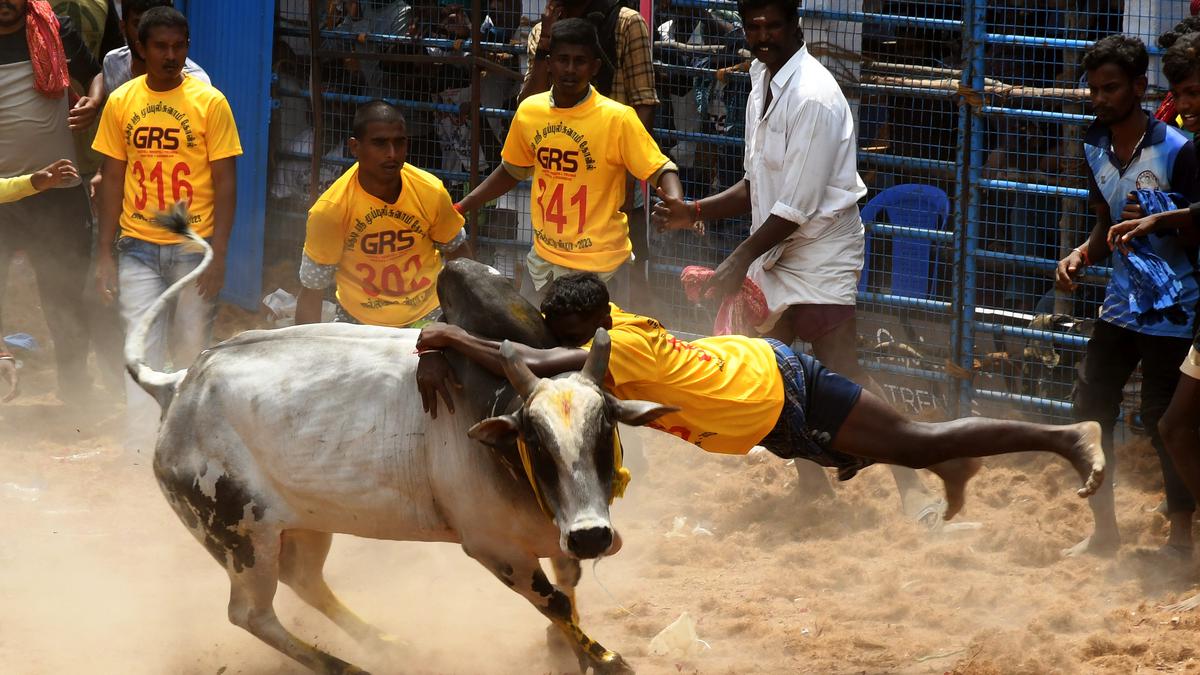Tamil Nadu’s Amended Law On Jallikattu Valid: SC
Context:
The State legislature’s determination that the bull-taming competition is a part of the people’s cultural heritage and history was upheld by the Supreme Court on Thursday, which described Jallikattu as a “type of bovine sport” that has been practised in Tamil Nadu for at least a century.
Points to Ponder:
- The Prevention of Cruelty to Animals (Tamil Nadu Amendment) Act of 2017 and the Prevention of Cruelty to Animals (Conduct of Jallikattu) Rules of 2017 were upheld by the Supreme Court as legal.
- The court declared jallikattu to be a “type of bovine sport” that has been a staple of Tamil Nadu’s history and cultural heritage for at least a century.
- The court also upheld identical rules passed by Karnataka and Maharashtra that permitted bullock cart races and buffalo racing (Kambala).
- The jallikattu law, according to the court, “substantially minimises” the pain and suffering experienced by the animals involved in the incident.
- A bull is let into an arena during the Jallikattu sport, and human competitors try to score by grabbing its hump.
- The Supreme Court outlawed jallikattu in 2014 because it was seen to be harsh. To address the issues mentioned in the earlier judgement, however, measures were implemented by the 2017 Amendment Act.
- The court concluded that the 2017 Amendment Act remedied the flaws pointed forth in the prior judgement and permitted the continuation of the traditional sport while minimising animal suffering.
- The 2017 Amendment Act and Rules’ safety measures must be strictly followed for jallikattu activities, according to a court order. In Tamil Nadu, the district administrations and responsible authorities were given the duty of ensuring compliance.
- The petitioners’ claims that jallikattu harmed bulls and went against their basic nature, including animal welfare activists and organisations, were rejected by the court.
- The court held that the previous Division Bench erred when it determined that jallikattu was not a part of Tamil Nadu’s cultural practice without having enough evidence to back up that conclusion.
 Jallikattu
Jallikattu
The traditional bull-taming sport known as jallikattu first appeared in the Indian state of Tamil Nadu. It usually takes place in January during the Pongal holiday. Key details concerning Jallikattu include the following:
- Tradition: Jallikattu is firmly ingrained in Tamil Nadu’s cultural and historical traditions and has been practised for generations.
- Location: The sport is held on an open field known as “vaadi vassal” or the bull arena. It is typically organised in rural settings when the local population comes together to observe and take part in the event.
- Bull selection: Specially bred and trained bulls are used in the sport of Jallikattu. Owners take enormous pride in the power, agility, and fury of their bulls.
- Jallikattu’s main goal is for contestants to hug and control the charging bull by clinging to its hump for a predetermined amount of time or distance.
- Jallikattu adheres to a set of laws and regulations to protect both participants and animals. However, specific guidelines may differ between locales and events.
- Cultural significance: Jallikattu is revered as a representation of Tamil pride, valour, and sturdiness. It is seen as a means of preserving the indigenous cattle breeds and promoting Tamil Nadu’s agricultural history.
- Concerns about animal welfare: Animal rights organisations have criticised Jallikattu, saying that it harms and stresses out the bulls. Regulations to ensure the welfare of the animals were created as a result of discussions and legal disputes about the sport’s continued existence.
- Evolution: Measures to safeguard the security of competitors and animals have been added as part of efforts to change the sport. These include building walls, putting in place veterinary examinations and encouraging non-violent sports.
- Identity symbol: For many individuals in Tamil Nadu, the jallikattu has come to represent their sense of self and cultural pride. Due to significant demonstrations and public discussions on its outlawing and reviving, it has acquired popularity recently.
- Jallikattu has drawn attention from around the world and is now acknowledged as a significant component of Tamil Nadu’s cultural heritage. Additionally, it has been included in documentaries and movies, which has raised awareness of it and increased appeal.


 Jallikattu
Jallikattu

